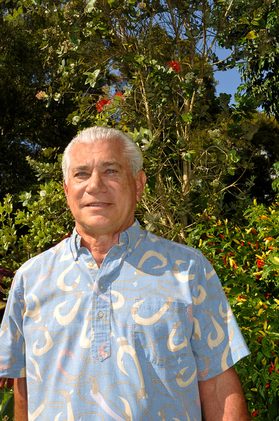
Dickson grew up nestled in an extended family spanning three generations, where he was given a solid foundation in traditional Hawaiian culture and values. “I was raised by all of them and taught by all of them. My grandmother on my father's side kept me close to her and she taught me about the culture and history of our family. From when I was young, it gave me a strong sense of community and how I had to help and assist, not just ride along. How I had to be a part of making it better or keeping it going,” says Dickson.
While growing up on Oahu, Dickson spent most summers on Hawaii Island. “My grand uncle, E. Woods Low, (son of Eben Low), used to bring me here to Hawaii Island. He was born and raised in Kohala and Waimea,” says Dickson.
While attending the College of San Mateo in the mid 60s, Dickson studied tele-communications, but soon found his passion in culinary arts, a skill which he would later use on his many canoe voyages. After a tour of duty in Vietnam, he returned to Oahu, but Hawaii Island and the family compound at Paniau was calling him back.
In the early 80s Dickson had settled on Hawaii Island and was working as a manager for Parker Ranch, when one day Kalani Schutte (then on the county council) came by and told him, “Put in your notice. You’re going to come work for me.” This began Dickson’s legislative career as the executive assistant to Schutte who became council chairman. Soon he was engrossed in legislative processes from the county level to the federal.
At the end of Schutte’s term, Dickson returned to Waimea to become the Executive Director of the newly formed YMCA, where he was able to develop sailing, diving and camping programs. “This was a good opportunity to engage the community in outdoor and ocean education,” Dickson says. “We were in the community doing stuff with the kids and it felt great,” he added.
Hawaiian Civic Clubs
In 1917 Prince Jonah Kuhio Kalanianiole saw the need to preserve and perpetuate Hawaiian culture and began the Hawaiian Civic Club of Honolulu. Since then a total of 58 clubs have formed throughout the islands and on the mainland, with nine clubs on Hawaii Island.
The primary efforts of the WHCC involve regular fundraisers to support their scholarship fund (preschool to adults), educational experiences in and out of the classroom, drafting of resolutions and bills in support of furthering community health and well-being and providing food at various events. The club also finds strength in making connections. “The Civic Club is a kokua organization that helps support all the different other entities that are accomplishing the same kind of goals that we are,” Dickson says.
One of the larger projects the WHCC participated in was the development of a cultural education program at Pu’ukoholā Heiau, as part of the 200th anniversary celebration in 1991. “We wanted to maintain [control of] the cultural aspects so we created Na Aikane o Pu’ukoholā Heiau,” says Dickson.
The focal point for Dickson’s continuing community efforts is Makali’i, for which he serves as quarter master and assists with educational programs, including Mala`ai’s monthly super kitchen events. “On the Hawaiian Civic Club side of it, we're helping the community with healthy eating. On the canoe side of it we're looking at eventually having these youth and the Mala'ai garden package items that can go on the voyage, that are healthy for us to eat,” says Dickson.
For Ma`ulili and many others like him, the way forward is through the continuing education and involvement of our youth to perpetuate the positive values of Hawaiian culture that will live on in the hearts of our children.
 RSS Feed
RSS Feed
